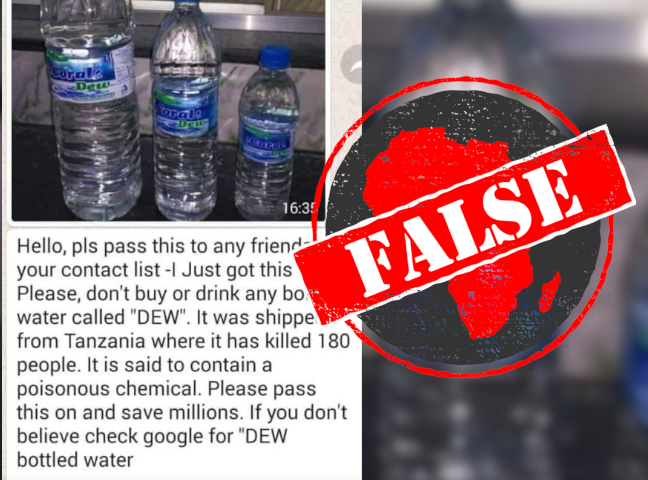A message circulating on WhatsApp and Facebook in Nigeria warns that the Dew brand of bottled water is poisonous.
“Please, don't buy or drink any bottled water called ‘DEW’. Customs said it was shipped into Nigeria from Tanzania where it has killed 180 people,” it reads.
“It is said to contain a poisonous chemical. Please pass this on and save millions. If u don't believe check google for "DEW bottled water". Save lives as I just saved yours.”
But if you “check Google” you’ll find that the message is an old hoax that has been debunked many times.

The claim first began circulating via text message in 2011. In response, Nigeria’s National Agency for Food Administration and Control (Nafdac) released a press statement dismissing the claim, which it called false and mischievous.
The agency said there were two water companies with similar names registered in Nigeria: Dew water in Lagos and DewLuk in Abuja. But an investigation at several hospitals found “no incident of hospitalisation or death arising from the consumption of Dew water, or any other brand of water”.
Nafdac added that importing packaged water into Nigeria was banned. As of November 2020, it is still on the list of prohibited and restricted imports.
The viral message has been debunked by Vanguard, Hoax-Slayer, Snopes, Dubawa and the South Coast Herald.
A variation of the message, which claims that Dew bottled water contains Ebola, a virus that causes severe bleeding, should also be considered false.
“Please, don't buy or drink any bottled water called ‘DEW’. Customs said it was shipped into Nigeria from Tanzania where it has killed 180 people,” it reads.
“It is said to contain a poisonous chemical. Please pass this on and save millions. If u don't believe check google for "DEW bottled water". Save lives as I just saved yours.”
But if you “check Google” you’ll find that the message is an old hoax that has been debunked many times.

Claim doing the rounds for nine years
The claim first began circulating via text message in 2011. In response, Nigeria’s National Agency for Food Administration and Control (Nafdac) released a press statement dismissing the claim, which it called false and mischievous.
The agency said there were two water companies with similar names registered in Nigeria: Dew water in Lagos and DewLuk in Abuja. But an investigation at several hospitals found “no incident of hospitalisation or death arising from the consumption of Dew water, or any other brand of water”.
Nafdac added that importing packaged water into Nigeria was banned. As of November 2020, it is still on the list of prohibited and restricted imports.
The viral message has been debunked by Vanguard, Hoax-Slayer, Snopes, Dubawa and the South Coast Herald.
A variation of the message, which claims that Dew bottled water contains Ebola, a virus that causes severe bleeding, should also be considered false.
Republish our content for free
For publishers: what to do if your post is rated false
A fact-checker has rated your Facebook or Instagram post as “false”, “altered”, “partly false” or “missing context”. This could have serious consequences. What do you do?
Click on our guide for the steps you should follow.
Publishers guideAfrica Check teams up with Facebook
Africa Check is a partner in Meta's third-party fact-checking programme to help stop the spread of false information on social media.
The content we rate as “false” will be downgraded on Facebook and Instagram. This means fewer people will see it.
You can also help identify false information on Facebook. This guide explains how.


Add new comment